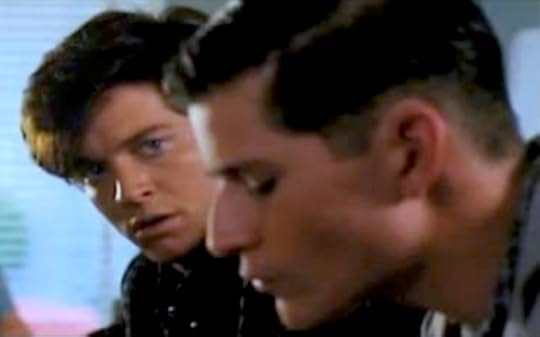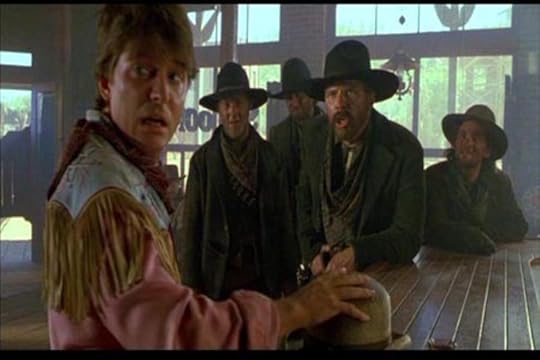Why I disagree with Stephen King about time travel
 Earlier today, I posted this link from io9 on my various social media sites after a small burst of excitement on my part. It seems that horror maestro Stephen King has a new book coming out, a science fiction tale named 11/22/63 which deals with time travel and the Kennedy assassination. My first reaction was "Oooh I'd totally read that", until I suddenly thought "But it's not a new idea - Quantum Leap and even Red Dwarf have done it". My third reaction was "So? I'll still read it." Confused yet? Well it seems that my problem is not with the idea itself. My problem is with Stephen King's explanation of the "rules" of time travel.
Earlier today, I posted this link from io9 on my various social media sites after a small burst of excitement on my part. It seems that horror maestro Stephen King has a new book coming out, a science fiction tale named 11/22/63 which deals with time travel and the Kennedy assassination. My first reaction was "Oooh I'd totally read that", until I suddenly thought "But it's not a new idea - Quantum Leap and even Red Dwarf have done it". My third reaction was "So? I'll still read it." Confused yet? Well it seems that my problem is not with the idea itself. My problem is with Stephen King's explanation of the "rules" of time travel.Yes, time travel has rules. I know it seems somewhat peculiar to ascribe rules to a phenomenon that was considered to be impossible (the potential discovery at CERN of particles travelling faster than the speed of light could render it possible but I'll wait until it becomes plausible before I put in my order for a DeLorean) but like anything, a concept needs to have rules so we know what to expect. Whenever someone breaks those rules, or tries to rewrite them, popular culture tends to shudder. Just say "Sparkly vampires" to diehard Stoker fans and see what happens.
Now, Stephen King has offered three rules as he sees them and it would appear I agree with only one of them.
First Rule
You do not talk about time travel. No, wait, wrong pop culture reference. King reckons that "The more potential a given event has to change the future, the more difficult that event would be to change. If you wanted to go back and speak to somebody on a street corner so that they were five minutes late to an appointment-that might not be too hard. But if you wanted to stop the assassination of a president, that would be really difficult. The past would try to protect itself." Balderdash. Poppycock. Absolute tosh. Past, present and future are all relative terms imposed by mankind as an attempt to assemble existence into some form of order. "The past" is simply events which have been and gone, and in believing it would "protect itself", you're attempting to attribute sentience to something that cannot be sentient.

Marty and George McFly
No, time is constructed of cause and effect. I do something, it causes something to happen (or not, as the case may be). The only reason why it would be more difficult to change a larger event than a smaller one is because more people are involved with larger events. That would give you more variables to control and more margin for error. Look at Back to the Future. Marty has to try and corral his parents into position AND manage their relationships with those around them in order to restore the timeline as best he can. That's more chess pieces he needs to manoeuvre on the board, so to speak. If he only had to convince his father to buy a particular type of aftershave, then that would be a single thing he could control, and it would be a much less interesting film.
Second Rule
[image error]
Bill and Ted
You do not - no, wait, I'm doing it again. King gets a little more philosophical here, and he states that "Every time you go back and change something, you create an alternate timeline. There are these guardians who stand watch over all the time portals, because they understand that whenever you go back, you damage the time-space continuum." What?! If you go back and change something, you don't create an alternate timeline - you simply alter the single timeline. Alternate implies a choice of timelines, but you can never then return to the original timeline (unless your name is Marty McFly). However I understand what he's getting at so I'll let that one slide. What I can't get behind is the concept of "guardians" or "portals". Where were they when Bill and Ted were kidnapping historical figures? In order to believe in these guardians, you'd need to also attribute that form of sentience to "the past" that I've already said I don't believe exists. If you believe that time simply unfolds and one event leads to another, then the existence of guardians would be rendered moot. Based on his wording, he believes the guardians only guard the portals when you try to go back and change something, but as no one has gone back to change anything (that we know of) then why would they even exist? True, the idea is not a new one by any stretch of the imagination but to me, the only thing preventing you from going back in time is the fact no one can actually do it. Yet.
Third Rule

Buford isn't impressed with Marty's get-up
This is the only one I think holds any water. As King points out, "The further back you go, the more precautions you have to take. It would go right to the language-you'd have to be careful about the way you speak; the accents would be different. If you were to return to, say, 1858, you'd really have to prepare ahead of time." That's a good point. I often wondered why no one queried Marty's use of 1985 currency back in 1955 when he first visits the diner. Doc has obviously thought ahead since he has the case of bank notes but Marty uses change out of his pocket - and no one bats an eyelid. Yes, they don't understand some of his slang, but imagine I travelled through time back to Newcastle in 1886 to prevent the brutal murder of five prostitutes by the notorious Daniel Fenie. Unless I wanted to stick out like a sore thumb and run the risk of being arrested (or committed) I'd need to have the right clothes and I'd need to know precisely how people spoke in the place I was going. Ironically, while we can know some things about history, we can never know everything, and there are some details that you'd just never be able to learn without going back there in the first place. Or you could just ask these mystical guardians that are guarding the time portals.

Published on November 03, 2011 13:33
No comments have been added yet.



